In this article:
A sour stomach is a common digestive complaint that can usually be treated at home with some simple remedies and self-care measures.

It occurs when gastric acid accumulates inside the stomach, which can be due to a variety of reasons such as indigestion. The excess acid irritates the inner lining of the stomach and may flow back into the esophagus, causing acid reflux and heartburn.
This condition is associated with several other discomforting symptoms such as bloating, nausea, vomiting, malaise, and burping.
The first thing to do to is to eat smaller meals and avoid caffeine, alcohol, whole grains, wheat, spicy foods, fried foods, and other items high in insoluble fiber.
The second thing is to lower your risk of getting a sour stomach or manage the condition, and one way is to use natural remedies.
Natural Ways to Relieve a Sour Stomach
Here are a few remedies that can help ease the digestive distress associated with a sour stomach.
1. Drink plenty of water

Increasing your water intake will help flush out the excess acid from your gastrointestinal tract and provide digestive relief.
Moreover, a sour stomach may trigger vomiting and diarrhea, which cause considerable loss of fluids from the body. This can give rise to electrolyte imbalance and dehydration, which further worsens indigestion and hamper your recovery process.
In such cases, it is all the more important to consume more than 8 glasses of water a day to rehydrate the body.
Excessive stomach acid may cause a burning sensation in the stomach. To alleviate this discomfort, drink ample amounts of water to help flush out the acid from your digestive system and provide a soothing effect.
One study examined the association between whole-day water intake and irritable bowel syndrome in a large sample of Iranian adults and reported a significant association between consumption of >8 glasses of water per day and relief from intestinal problems such as indigestion and a sour stomach. (1)
2. Apply a warm compress
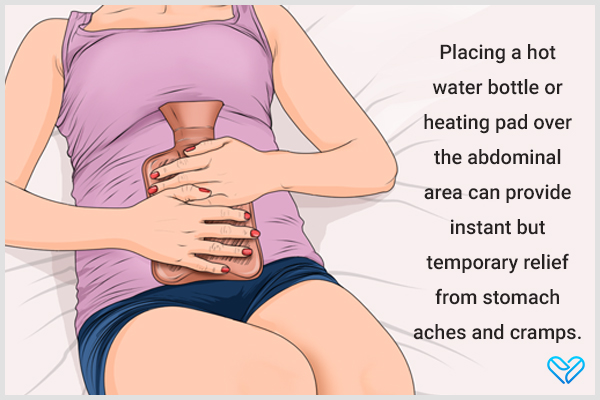
Placing a hot water bottle or heating pad over the abdominal area can provide instant but temporary relief from stomach aches and cramps. The application of gentle heat helps relax the underlying muscles and stimulates blood circulation in the area and thus soothes digestive discomfort.
Since this therapeutic effect only lasts for a short period, you need to reapply the warm compress multiple times, as and when needed.
Using a hot water bottle may relieve stomach pain, and the warmth on your stomach may distract you from the cramping or pain.
Anecdotal evidence from a study on a 26-year-old woman suffering from abdominal pain due to eosinophilic gastroenteritis (EGE), which is a rare inflammatory disorder characterized by eosinophilic infiltration of the intestinal wall, showed that relief was obtained after using a warm hot water bottle along with medications. (2)
3. Drink ginger tea
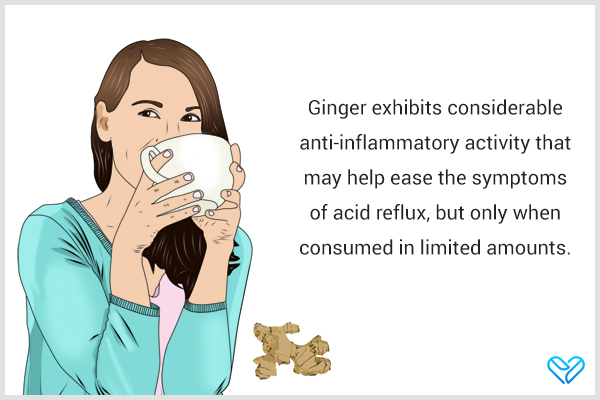
Ginger exhibits considerable anti-inflammatory activity that may help ease the symptoms of acid reflux, but only when consumed in limited amounts. It can help soothe the irritation in your stomach lining caused by too much acidity. (3)
Drinking a cup of ginger tea helps in alleviating stomach discomfort.
4. Drink chamomile tea

Chamomile is rich in antioxidants that help alleviate the symptoms of an upset stomach, such as nausea and vomiting. It contains bisabolol, which has anti-inflammatory properties and can relax the smooth muscles in the digestive tract.
Chamomile tea is commonly used to relieve abdominal cramps, bloating, indigestion, nausea, diarrhea, and other gastrointestinal issues. (4)
5. Consume a baking soda solution
Sodium bicarbonate, commonly known as baking soda, is widely used as an antacid. It can neutralize the excess stomach acid and alleviate heartburn, acid reflux, indigestion, and other symptoms associated with a sour stomach. (5)
A case report showed that baking soda can settle stomach acidity but can be problematic for heart health, if taken regularly in higher dosage. (5)
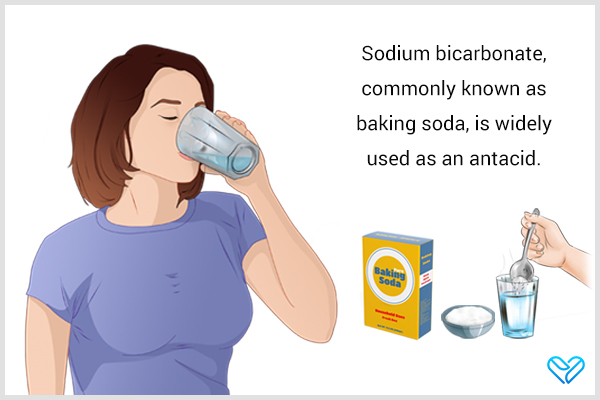
How to use:
- Add ½ teaspoon of baking soda to ½ glass (4 fl. oz.) of water.
- Dissolve the baking soda completely in the water.
- Consume this mixture every 2 hours or as directed by the physician.
Note: Accurately measure ½ teaspoon. Do not take more than the recommended amounts in 24 hours.
Caution: If you have high blood pressure, do not take baking soda as it contains sodium.
6. Drink aloe vera juice
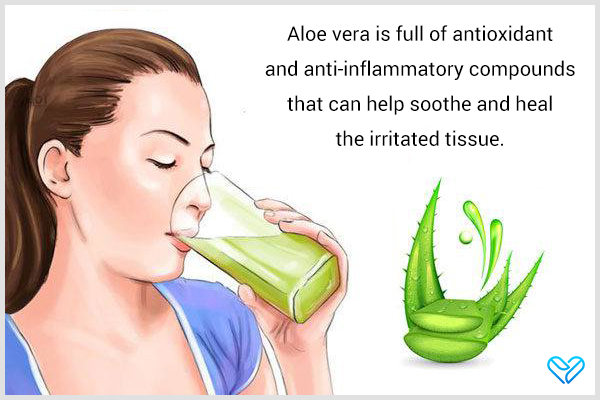
A sour stomach is characterized by too much gastric acid, which burns and damages the inner lining of the digestive tract.
Aloe vera is full of antioxidant and anti-inflammatory compounds that can help soothe and heal the irritated tissue. (6) Moreover, it may even curb the production of gastric acid to ease your symptoms.
How to use:
- Blend 2 tablespoons of freshly extracted aloe vera gel with 1 cup of water until it acquires a smooth consistency.
- Drink this mixture once daily until your symptoms subside.
Note: Do not take aloe vera in excess, as it can cause diarrhea.
7. Consume a bland diet

A bland diet comprises nonspicy, low-fiber, low-fat, and lightly cooked foods that are easy to digest. The purpose of this diet is to give rest to your gastrointestinal tract and reduce acidity.
Foods to include:
- Low-fat dairy products
- Broth
- Tea
- Rice
Foods to avoid:
- Fried or greasy products such as junk food
- Spicy foods
- Seeds and nuts (use nut butter instead)
- Non-lean meat such as beef, fried fish, and chicken with skin
- Strong cheeses
- Gas-producing vegetables such as cabbage, cauliflower, onions, and pepper
- Alcohol
- Coffee
- Soda
- Energy drinks
- Fatty dairy such as whole milk, ice cream, and whipped cream
- Acidic fruits such as grapes, oranges, berries, and lime
- Wholegrain products
- Pickles, dressings, and sauces
Additional tips:
- Pureed fruits and compotes are preferred over raw fruits, which are hard, fibrous, and therefore more difficult to break down by the stomach.
- Broiling or mashing your food will make it easier to digest.
- Drink fruit water or tea in place of soda, coffee, and energy drinks. (7)(8)
8. Consume bananas

Bananas can stimulate the production of mucus from the stomach lining. This mucus acts as a barrier against the excessive gastric acid collected inside your stomach and thereby helps reduce your digestive distress. It neutralizes the stomach acid and thus provides a soothing effect. (9)
What Is a Sour Stomach?
Your stomach contains specialized epithelial cells called parietal cells, which secrete gastric acid, which helps break down food, absorb nutrients, and kill harmful bacteria.
Eating, smelling, and even thinking about food trigger the release of a hormone called gastrin in the bloodstream, which then stimulates the parietal cells to produce gastric acid. This digestive fluid is mainly composed of hydrochloric acid along with certain enzymes.
The buildup of hydrochloric acid in the stomach or gastrointestinal tract can give rise to acidity, heartburn, tummy ache, and many other symptoms of digestive distress, which are collectively described as a sour stomach.
This usually happens when the food you ate the previous night or a few hours back does not get properly digested. (10)
Symptoms of a Sour Stomach
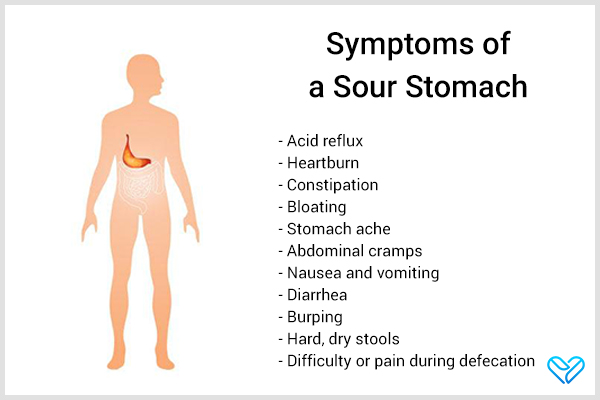
- Acid reflux
- Heartburn
- Constipation
- Bloating
- Stomach ache (11)
- Abdominal cramps
- Nausea and vomiting (11)
- Diarrhea (11) (more common in irritable bowel syndrome rather than in peptic ulcer)
- Burping (12)
- Hard, dry stools
- Difficulty or pain during defecation
- Feeling sick (12)
Causes of a Sour Stomach
Here are some common factors that can lead to indigestion, eventually causing a sour stomach:
- H. pylori, which is a common gastric pathogen
- Overeating
- Food poisoning
- Diarrhea
- Lack of physical activity or a sedentary lifestyle
- Eating too quickly without proper chewing
- Sleeping right after eating
- Late-night eating
- Menstrual pain
- Gastrointestinal tract infection
- Irritable bowel syndrome
- Gallstones
- Appendicitis
- Poor sleep (10)
Doctors broadly classify the causes of a sour stomach into three groups:
- Organic lesions – Reflux esophagitis, hiatus hernia, and peptic ulcers
- Functional – Faulty dietary habits, addictions (drugs, cigarette smoking comes under drug addiction)
- Psychogenic – Forms an important group nowadays, especially in somatic depression and anxiety disorders
Your stomach tends to produce gastric acid even when you have not eaten anything. Going without food for a long time will lead to the accumulation of hydrochloric acid in your empty stomach, resulting in a sour stomach. (13)
It is also recommended for patients with gastrointestinal problems to eat more meals each day – a minimum of 3 and optimally 4–5 meals a day. It can be assumed that with 1–2 meals a day, each meal is larger. (13)
Treatment for a Sour Stomach
Treatment for a sour stomach depends on the cause. You can try OTC medications such as gas relievers, antacids (such as Tums and Rolaids), laxatives, antibiotics, or antidiarrheal drugs to relieve mild to moderate stomach aches. (14)
For stomach aches, antispasmodics are better than antidiarrheal drugs. Antispasmodic medicines are used to treat symptoms such as tummy pain and cramps (spasms). They are better because the side effects that may occur are usually minor.
Diagnosing a Sour Stomach

Doctors use the following diagnostic tools to identify the cause of a sour stomach:
- Blood, urine, and stool tests
- CT scan
- Upper endoscopy (a tube is inserted through the mouth into the esophagus, stomach, and upper small intestine)
- X-ray of the abdomen
Ways to Prevent a Sour Stomach
Here are some tips that can help you avoid the problem of a sour stomach:
- If you routinely develop digestive problems after consuming dairy foods, get yourself tested for lactose intolerance. In case you have it, you need to eliminate dairy from your diet.
- Avoid fatty and spicy foods.
- Instead of having three heavy meals a day, consume several small meals at short intervals throughout the day.
- Take your dinner 1–2 hours before going to bed
- Chew your food thoroughly.
- Drink plenty of water to keep your digestive system working properly.
- Stay active and try to exercise regularly to promote optimal digestion and gastrointestinal health.
- Try to get at least 7–8 hours of sleep every day.
- Avoid smoking, alcohol, and chewing tobacco as much as you can.
- Don’t eat citrus foods on an empty stomach.
- Keep stress under control as it can disrupt your digestive functioning.
- Limit the intake of foods that produce gas.
When to See a Doctor
A sour stomach is generally not a cause for concern, but you should consult a doctor in the following cases:
- Stomach ache that persists for more than a day
- Sudden and severe abdominal pain
- Bloody stools
- Frequent vomiting
- Inability to keep down food and fluids
- Unexplained weight loss
Final Word
The problem of a sour stomach has become increasingly prevalent among the masses due to a growing dependence on junk and processed foods compounded by a lack of physical activity.
The good news is it can easily be avoided by adopting a few favorable lifestyle and dietary changes such as the ones mentioned above. Exercise regularly, maintain proper fluid intake, and consume a healthy well-balanced diet.
Also, it is common for people to suffer indigestion and acidity occasionally, which can be resolved through simple home remedies. However, if the condition becomes a frequent occurrence and persists despite the recommended home treatment, consult a doctor for a proper examination.
- Was this article helpful?
- YES, THANKS!NOT REALLY


